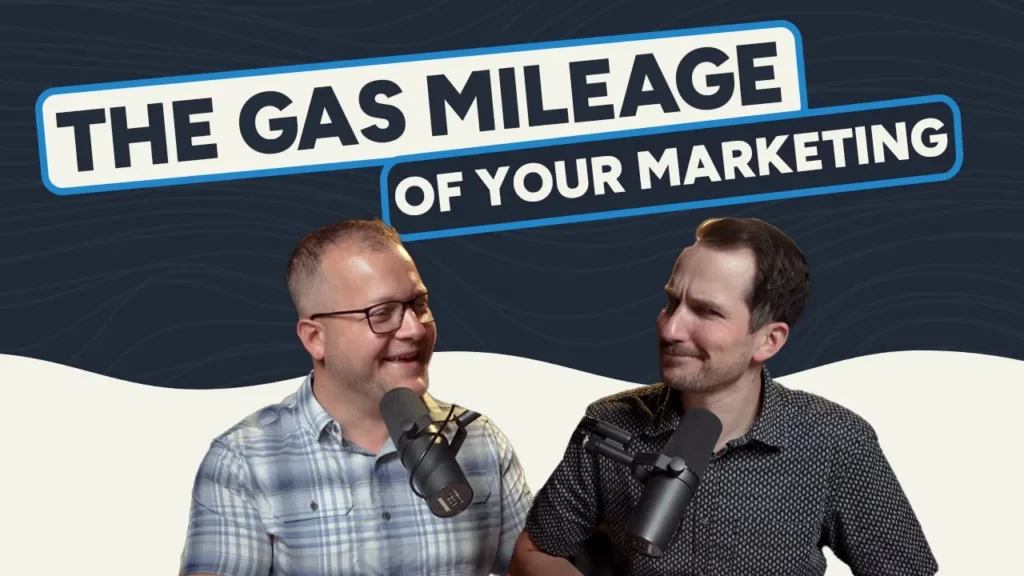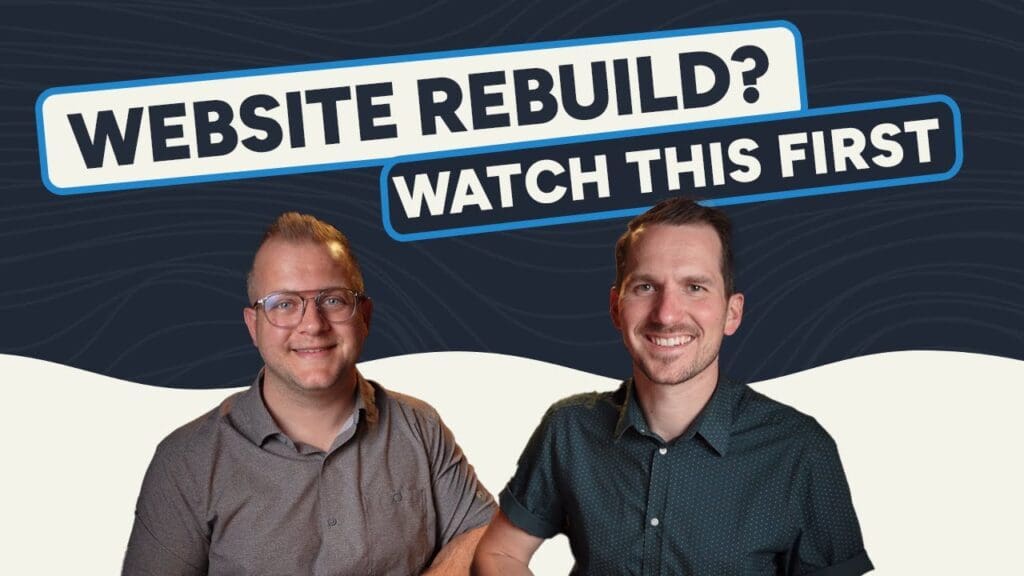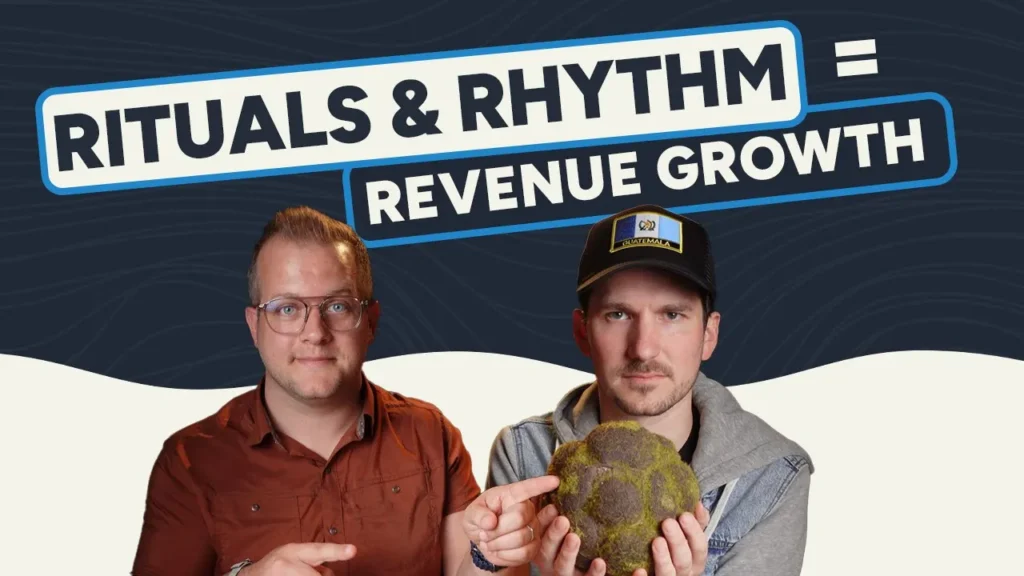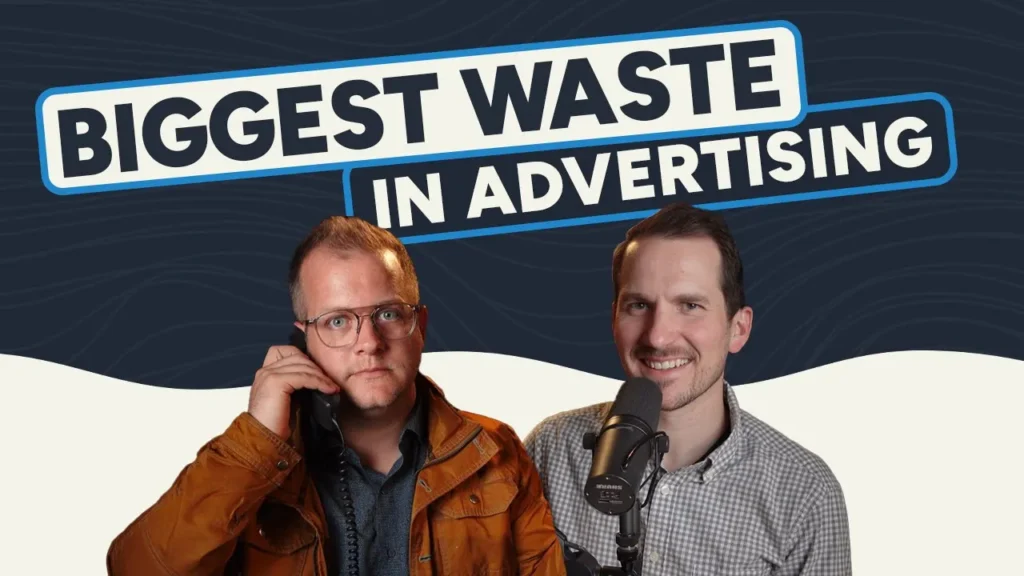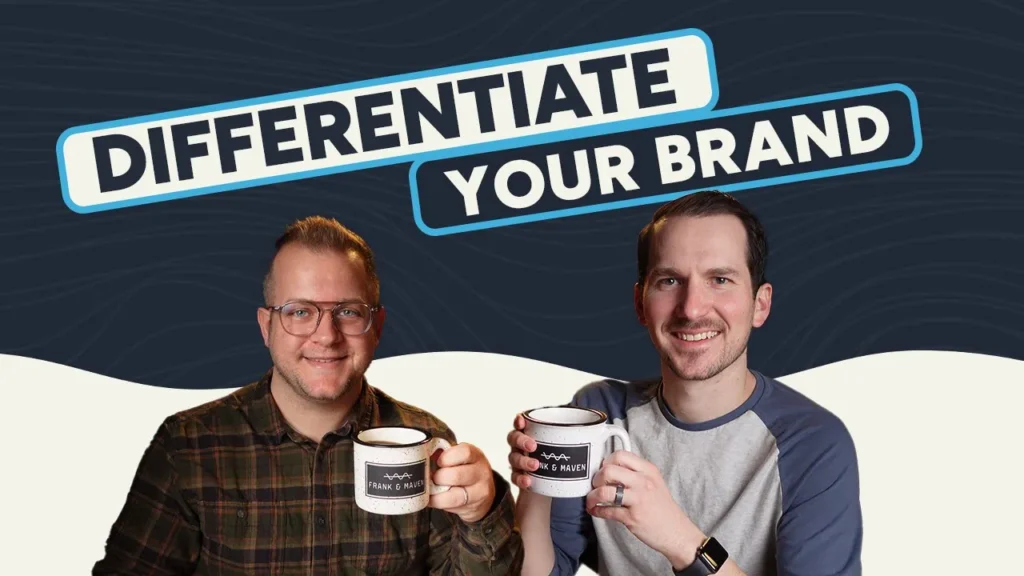How to Get Your Customers to Take Action

How to Get Your Customers to Take Action:
Want to get more response from your advertising?
Do you have a big fancy website that isn’t bringing you enough leads?
In this episode, Brandon and Caleb break down what really makes people take the next step and the tactics you can use to make all of your marketing pay off in the short, and long term.
Special bonus advice for anyone using TV or radio advertising right now!
Tune in for Maven Monday, where we help you eliminate waste in advertising, grow your business, and achieve the big dream.
01:24: Should I use a phone number or a website URL in my ads?
02:20: Best call to action for TV advertising
04:45: Best call to action for radio advertising
05:45: Adjusting for the type of business you are in
07:40: How to make people like you
10:20: Print Media
—
12:50: What to say on your website to make people take action
14:25: The most important word in marketing
17:35: Examples of how to apply CTA strategy
—
19:15: How to make ads that bring results for years
20:20: How to leverage an economic downturn to steal market share
21:05: How to be a better company, dad, and husband
22:39: A weekly encouragement for you
This Episode Hosted by:
Recent Episodes:
What Are CPMs? The Gas Mileage of Your Marketing
Rituals & Rhythm = Revenue Growth
Get New Episodes In Your Inbox:
We'll be back every Monday answering your real life marketing questions!
Listen to Audio Only:
Keep Sharpening Your Marketing Skills With The Maven Marketing Podcast
What Are CPMs? The Gas Mileage of Your Marketing
CPMs are the great equalizer of marketing media. To make great decisions, you need to know how…
Rituals & Rhythm = Revenue Growth
Culture eats strategy for breakfast—and in this episode, Brandon Welch and Caleb Agee show you why rhythm…
The Single Biggest Waste In Advertising
You might think the biggest waste in advertising is bad creative, weak targeting, or outdated platforms. But…
IDKWNTHTB – Keep Showing Up!
Every business owner hits the wall. You launch the campaign, tweak the copy, show up every week—and…
Stop asking, “How did you hear about us?” (do this instead)
It’s lurking… tucked into a form on your website or maybe it’s a part of your sales…
IDK Who Needs To Hear This But: You Need To Fill One Glass At A Time
FREE MARKETING AUDIT: MavenMarketingAudit.com Get a copy of our Best-Selling Book, The Maven Marketer Here: https://a.co/d/1clpm8a Our…
How to Immediately Differentiate Your Brand
There are no more unique value propositions. You could invent the next big thing and you’ll have…
Brandon Welch 0:00
We tend to think this money we’re paying in advertising is our permission to talk about us, and that is the last thing you want to do. Flip that around, and the best word, if you can fit it in, that you can use, is you, you, you, your
Caleb Agee 0:13
Y, o, u.
Brandon Welch 0:20
Welcome to the Maven Marketing Podcast. Today is Maven Monday. I’m your host, Brandon Welch, here with Caleb Agee. Caleb Agee, and this is the place where we answer your real life marketing questions so you can eliminate waste in advertising, grow your business and achieve the big dream. What is the theme of today’s episode? Caleb,
Caleb Agee 0:40
yeah, so today we’re going to be talking about meeting the customer where they are. So I think a lot of marketing and advertising, we think about all the tools, all the things we have to do to make it work, right? But if we don’t first, shiny objects, yeah, shiny objects is like, what, geo fencing and what, you know, all these things, yeah, click through rates and impressions. Should I have? We need to stop thinking about that. And the first thing we need to think about is the human on the other side of that. And that is where it all starts. But
Brandon Welch 1:10
this comes in the form of some very real questions and some things that lead us to talking about that. So we have meeting you where you are, which are the questions and the things I’m sure you’re wondering in your business. And we have two very solid businesses today to talk about, Yeah, jump right in the first one into these questions.
Caleb Agee 1:26
First one comes from Jeremiah. He’s in Long Island, New York, and he’s asking, should I use a phone number or a website link or URL as a call to action to my ads? Awesome. He’s specifically talking I know, we we know Jeremiah, he’s running TV ads, and he’s asking at the end of those ads, you know, you imagine the splash screen with your logo, yes. Should it be my phone number or my my web URL?
Brandon Welch 1:50
Yes. Awesome. So this is, this is one of those questions where, unfortunately, the answer is, it depends, but assuming that we’re talking about TV and radio. I’m going to jump right in there. Then we’re going to talk about calls to action in general. This is actually very inherent and just native to our Maven method, which, if you’ve read our book, you know all about if you haven’t, you should get our book. But that’s going to be the last part of the process, which is what is the most reasonable next step? And I want to frame all answers into what is the most reasonable. And rather than saying, you know, what is statistically better phones or, you know, email leads or website or whatever, ask yourself, what is the person doing right now in their life, and what is the most reasonable next thing to ask them to do? Yeah, sometimes it’s calling, sometimes it’s website, sometimes it’s neither of those things, but we’re always going to if I were this person being exposed to this ad, this time of day, this environment, yes, and so with TV, it’s mostly at home, right? And statistically, most people even well into their 60s and 70s are on their phones anyway, or it’s nearby, yep. And this has kind of changed, because even, you know, 10 years ago, you could have argued that there was a bigger part of the population that just isn’t native to that. But it also, you’ll also think about, how old is my customer? How old is the perfect person that I want, and what is the most compassionate thing? Yeah, TV in general. We’ve tested this a lot of times. It is probably less friction to have somebody hit a URL, because most likely, if they’re experiencing TV in the environment that most people are, which is on their couch or their kitchen table, that’s just an easier ask. Yeah, and as as internet usage has become more native to today’s culture, it’s also a less threatening ask, because we’re not going to get followed around or sold. Yeah. And if you think about it, it’s safer, because for the person, for the human being you’re trying to talk with, they can just do it in their own time. Now, the trade off for that is it’s probably less quality than if you were to compare it to somebody who was ready to pick up the phone. But short answer is probably the URL, based on our testing. And the nice, nice addition of a URL is, if you bake it into your script and you’re tying everything back to all you need to do is go to insert your company name.com, it’s a, it’s a helpful, utilitarian way to insert your name without it sounding like, remember,
Caleb Agee 4:30
you know, maybe,
Brandon Welch 4:33
yeah, remember Frank and Maven for all of your advertising needs. And that just gets you out of the cliche mode, and you’re using it in sentence form, which sounds like real talk, which is one of the main things you need to do, so just tactically and statistically, and what people on the whole are supposed to are most likely doing is probably going to be a URL. Now is the same thing true in radio you. I don’t know that it would be. Where, where are people most often listening radio, driving to work, driving down the road. Now, the fact that people text and drive all the time is besides the point. If you are in a direct response environment, it’s probably a phone number and radio, yeah,
Caleb Agee 5:20
easier to dial 10 digits than it is to type in the whole URL. Now
Brandon Welch 5:24
this is all. Both of those answers were given on the assumption, because if somebody’s asking, I want call to action, what they’re probably really saying is I want my phone to ring off the hook. Yeah. And so I would take it to even a third level and say, Is that the reason you’re advertising and should you be? It’s not that we shouldn’t want that result, but is that? Is that the biggest and best outcome? Because if you’re talking about TV or radio, which we would put in the category of broadcast, anything that is reaching a lot of people at the same time, like any media’s billboards would be in this category. Some print would be in this category, but, but things that are typically referred to as commercials, what you have to ask is, what category Am I in? And of all the people I’m reaching now, which, in the case of New York City, could literally be hundreds of 1000s of people, yeah, in one shot, yep. In the case of a smaller city, might be 10,000 Right? Or might even be in the hundreds. But you have to ask, is it even reasonable to base my only expectation of this ad, or my biggest expectation is that people stop their day and call for my category? Jeremiah is in the real estate business, and, you know, it’s a great business, but statistically, right now, the time of this ad running, or any other minute a day, like, if it was the best it could possibly be, like, is that, are those 100,000 people? Is there a bunch of them just waiting to hear your phone number or waiting even to hear your website? Because
Caleb Agee 6:59
what, statistically, real estate moves at once every five to seven years.
Brandon Welch 7:04
Five to seven years, and you know, if you’re, if you’ve got a even a more specific real estate action that you’re in, or type of category, it could be longer than that. Yeah. So if it’s, if it’s once every five years, that means, do the math, it’s once every 60 months, and you’ve got, like, way, way less than 5% of the population at this given time even considering
Caleb Agee 7:26
it, yeah. And, and then the percentage of them that actually own homes don’t rent, and
Brandon Welch 7:31
the percentage of them that happen to be doing something about it right now and happen to be watching this program and happen to be paying attention to you. So which kind of goes back to the original thing. The the bigger use of broadcast, unless you’re selling something that is really short term, like food or entertainment or some sort of an event, the bigger use of it is make people like you. And because if you say, call me now. Call me now. Call me now. Yeah, you’re programming them not to care about you because they weren’t going to do that. There’s nothing you could say short of giving them a million dollars that would actually make them do that, then they’d have to believe you. And so if it’s if it’s really for a a steadily growing business, what you’re using broadcast for is becoming so well liked and trusted that people, once they enter that moment, they don’t have to go to a search engine. They don’t have to think about anybody else, and it’s not really about your phone number. They’ll go to the search engine and look for you. They’re remembering your name. Yeah, and to remember your name, it’s not just name awareness. We write a lot about this and the Maven market, or most people just need to get their name out there. It’s the feelings you would tie with them. So entertain them. Be candid with them. Talk to them in plain talk. Say things that are unpredictable. Um, things that are memorable, because things that are things that are cliche in the mind, are easily forgotten. Yeah, and they, or at least they won’t attach them to you. So I would, I would say the question is kind of irrelevant, because longer term buying categories, which is by and large that we work with, and it’s by and large, but the economy is like, yeah, okay, if you’re a mechanic,
Caleb Agee 9:20
or, uh, unless you’re silage, unless you’re selling cheeseburgers roofer
Brandon Welch 9:24
or a doctor or an attorney, yeah, unless you’re selling cheeseburgers or toilet paper, they’ll need you every day. The statistical chances are that they’re it’s your ad, even if it’s the best place to add in the world, they’re just not ready to do that. So that’s like a that’s a secondary action. And what happens to companies that do this and they we have a lot of them right now that have just done this for the last four or five, 810, years with us, that are that are just constantly becoming well known and liked with their community at times right now where things are shrinking, they don’t have these woes, yeah, because the people that are. Buying are buying from them, and they trust them first. And while they still have search engines for people to look up their name and find them on a list, they’re just so much more trusted their clothes raised are staying strong. They’re having less problems than people who are not doing that. So yeah, that was a long answer, but, and then I want to go just really quickly, if it’s another media, like anything print related, I would say, consider the time of day and the day of the week and what’s going on in this person’s life. Yeah, a mom who is fed up with her, you know, babysitter, and sees an ad for daycare or something like that, probably, she’s probably gonna want to see and read before she just calls and drops her kid off. So probably a website leader to that second reasonable step,
Caleb Agee 10:52
yep, but she wanted to take a tour. I would want to see where my kids are going. Exactly.
Brandon Welch 10:56
She wants to read about them. She wants to do that research. Don’t, don’t say call now, but somebody who’s selling more of a, you know, impulse service or a seasonal service, a phone number might be better, because the time is right for them to pick up the phone. And
Caleb Agee 11:11
then I think there’s, there’s just a really practical standpoint that we need to take into account, which is, Are you open? Are you answering the phone right now? Because if you do a phone call to action and you ran in the 10pm news or on radio, you have really wide day parts. Yeah, if you, if nobody’s answering the phone, they’re not going to leave a voicemail. Nobody leaves voicemails anymore. So you’re, you’re probably in wasting dollars absolutely
Brandon Welch 11:38
at that point, no doubt about it. So Google is always both phone number and click, yeah, Facebook is probably Click to Website because it’s somebody scrolling Facebook. They weren’t asking to pick up the phone on call. Yeah, that’s a, that’s a heavy ask, granted, when you get somebody that does do that, they’re probably really serious, yeah, but take them to the website and they can do both, yeah, like, the website’s an easier, less friction, actually, yeah. Great question. That’s
Caleb Agee 12:03
great. Thanks. Jeremiah. Appreciate that. If you would like your question answered here on the podcast, we would love to hear it. You can email us at Maven Monday at Frank and maven.com By the way, MAVEN is spelled, M, a v e n. M, a v e n. A lot of people the there’s the eye. They use the eye. So I want to make sure it’s a Maven Monday at Frank. And what is a Maven? A Maven is an expert with the heart of a teacher, expert with the heart of teacher. And that’s why we’re here. That is what we’re doing right now. We want, we we hope, to be experts, and we love to teach. We love to do we’re constantly growing. And
Brandon Welch 12:41
really the only thing behind that is we’ve just done it a couple 1000 more times than the average person. So anybody can can learn this stuff. Just
Caleb Agee 12:49
got to get your hours right. We have another question, yeah. Next question is from Jason and Mindy, who work with a nonprofit here in our town called victory mission. They work every day to help people caught in homeless situations, to keep them safe. They have they have shelter opportunities. They even have a for profit, like coffee that they help homeless people get their first job out of out of homelessness, and then they sell that coffee as well. It’s a revenue opportunity. Beautiful organization, lots of great stuff, saving lives. We have the opportunity to help consult them from time to time, and they sent us this question, if you only have seven seconds with somebody on a website, what do you need to say? How do you prioritize messaging and tell a succinct story?
Brandon Welch 13:35
Okay, so even though this is for a nonprofit, what we’re going to teach here is universally applicable to virtually every situation, from advertising to sales to email with a co worker to persuading somebody to see your point of view. Yep, and Mindy and Jason are both brilliant people, great marketers. And, man, they give so much to this cause. So I’m gonna answer them in the context of, what should they exactly do on their website? Yeah, and they actually have a really good example. But then I’m gonna take that and say, Okay, here’s how you can apply that to if you are not your website, yeah, if you’re not doing the things they’re doing, which,
Caleb Agee 14:17
by the way, the principal, yeah, the principal applies to Billboard, and it’s the theme of today’s
Brandon Welch 14:21
episode, which is the people meet people where they are. Yeah, we tend to think this money we’re paying in advertising is our permission to talk about us, and that is the last thing you want to do. You’re going to lead them to thinking and feeling good about you. But what’s the number one secret to making anybody like you,
Caleb Agee 14:40
listening, asking questions, making it talk about
Brandon Welch 14:44
them, yeah, yeah, empathy, talk about them, yes. So that is true for website copy, and they actually have a really decent start to this. And if you were to go to the website, it says every life has a purpose, and they. Got the feel of that right? And I’m gonna say I wouldn’t, I wouldn’t sit and throw darts at this one, but if I were making it to tell us a sync story, as they asked, flip that around, and the best word, if you can fit it in, that you can use, is you, you, you, your why. Oh, you, why. Oh, you right. And so they start every life has a purchase purpose, and they say victory mission teaches people coming from homelessness to be independent. Start telling what they do. Okay, not bad. But what if we instead switch that? And I’m going to assume that their number one goal of this website is to get potential donors to feel and do something about it. Yeah, you could argue this is for their consumers, their consumers, the people that they help, but it’s it’s probably for donors giving the context clues here. And so let’s go straight to them. Let’s do some conviction in a non profit. What you’re selling is not actually give us a donation. What you’re selling is people feeling like they’ve done something so that they don’t feel bad about the problem anymore. That’s a really crass way to say it, but you’re really giving people an opportunity to not feel bad, yeah, for for the thing that you’re doing, which is which leads to good things, yeah? So what if we said, instead of every life have has a purpose, let’s switch that around to you and say, This is your moment to save a life. Every life has a purpose, good, but I go here, this is your moment to save a life. And I’m like, Oh, wow. I thought I was just visiting a website. Yeah. It’s like, huh, you’ve taken me to I can leave this website helping save a life, or I can leave this website not doing anything about
Caleb Agee 16:40
that. You you physically pointed when you said you’re, there’s, there is a a non physical pointing that you you are doing when you switch, you put that you word in there, you are pointing at the customer and saying,
Brandon Welch 16:53
You Are you ready? Bub, like, yeah, you’re ready to go. And so for a lot of people who are on the fringes of this cause. Like, that’s a convicting moment. It’s like, okay, I was looking for a sign. I think this was it. So, so for fun, we’re gonna just add in the subtext there. This is your moment to save a life from suicide, addiction and homelessness and holy smokes, because that is exactly what they do. First of all, it’s accurate, yeah, but you want to save a life from suicide. Holy smokes, that’s everybody has somebody in their life they can probably immediately recall, yeah, that they’ve known. And then the buttons are, I think, perfect. It’s like, donate or help, yeah? And it’s like, I don’t even need to go any further to know what I’m supposed to do here, right? Yep. So let’s talk about how we might do that for, say, a service that is not saving lives. Let’s just say it’s a legal service, okay, right? You want to go to the biggest universal need, pain, hope or fear, that that average web visitor could be looking to solve. And you want to speak to that and say, Are you ready to insert hope that they have? Are you ready to not fight with your family about money anymore? Are you ready to get on with your life? Are you ready to get what’s rightfully yours, if I’m an attorney, yep, I think for our, one of our roofing clients, we say stress free, mess free. Are you ready to have a stress free, mess free roofing project? And we just, we kind of determined that people, one of people’s biggest like hesitations and like irritation factors is the uncleanliness of roofers and people on their house, yeah, and just the whole process. So we said, dress free, mess free, right? And so you’re looking to just knock on that biggest pain. This is all about meeting people where they are, what was the original problem they had. And guys, if you’ll do that, in any corner of your ads, even ones that are great ads, like, there’s great ads that we write sometimes, and we go back and we go back and we’re like, we could get a little closer to the customer here. Yes. And that’s what good campaigns, that’s what good brands are all about. Is this world you’re trying to create this pill you’re willing to die on for your customers so that their life is better. Yeah. And when you do that, and your words reflect the heart that you have about that you just become a magnet for customers. Oh yeah. We talked to a customer this morning who’s growing nicely in a category that every one of their competitors is shrinking by 20, 30% year over year. Oh yeah. And they’ve put this out in the world. They have a guarantee for the way they will handle you if they’re in your home. They have a guarantee for how often, how long their salesmen are supposed to be in and out of your home. They have a guarantee for the values that they’ll uphold. They have a guarantee for all these things they’ve been talking about them for years, and their product and their name and their website and their phone number is just these little nice to have additives you. To land the message. But the big thing that sticks is somebody who’s not even remotely close to buying in their category remembers them. Yeah, and one of their sales people today on a call we had said, Man, we have people calling us that, you know, reached out three years ago, but they told us that they were the ones, and they’re still reaching out today. And it’s like if you’re if your message is programmed to call now. Call now. Call now. If you need blank, call now. You died the second That ad was over, yep, and you got all you were gonna get, yep and so meet them where they are, hold their hand, be the long term provider, and while everybody else is just floating and flying in the wind and subject to all these things, you’re the guy that’s just or the gal that’s just slowly growing through it all. Yeah, and, and on the backside of that storm, as I think we’ll have, you know, a year or so from now, people will wake up and they’ll realize things aren’t as bad as they thought they were, and things will kind of go back to a better normal, yeah, and you’re still the guy you got because you were committed and consistent all through that, you ended up, like, taking five steps up where your competitors are just coming back to the surface. So
Caleb Agee 21:09
it’s really just the rules of good relationship, and at the very end of the day, that’s all it is. I need to be a good husband, yeah, if I want to be a good husband, you want to be a good husband, good father, good friend, good co worker, whatever it is, it’s all of it is show up for people. If I, if I come in and I’m like, I need, I need, I need. I’m not a good employer. I’m not a good friend. I’m and I’m asking. It’s just the me monster, asking for all kinds of remember, I need these things. But if I come and I say, How can I help you today? Or Or better yet, I don’t even ask you how I can help you. I just start helping you, start helping me. And that teach me something. That’s what we’re doing. It’s make me laugh. We’re building this relationship for years. And a lot of times there’s this, it’s like that. You know, everybody had that friend in high school where his girlfriend was, like, really clingy and annoying. And you know those people you can picture right right now in the back your mind, like the supermarket, so, but that that is like the biggest it scares people away. And that is what people are doing in their ads. Are like, call me, call me, call me, call me. It’s like this desperate, did you do you hate me? Do you hate me? And instantly it turns off. Everybody turns them all off. And instead, we just were there. We’re sorry,
Brandon Welch 22:23
the desperate girl, or do you want to marry the sweet and steady girl? Guess
Caleb Agee 22:27
what? Because hopefully you’re not going out of business tomorrow. So why are you marketing like you are? Yeah, exactly. I don’t know, beautiful.
Brandon Welch 22:36
So that is the episode we have for you today. If you enjoyed this. Please subscribe. Hey, share it with some friends. We are trying to change the lives of business owners, yeah. And we’re also doing, frankly, Fridays, which is something we’ve done for a long time, and those are more philosophical, you know, Dad, friend, business owner, visionary type. You can call them rants or blogs, or whatever you want to but those are three, three minutes on your Friday morning to hopefully inspire you and remind you of who you want to be. So we’ll be here every Monday answering your marketing and advertising questions, because marketers who can’t teach you why are just a fancy lot are just a fancy lie. We’ll see you guys next time. Thanks for watching

